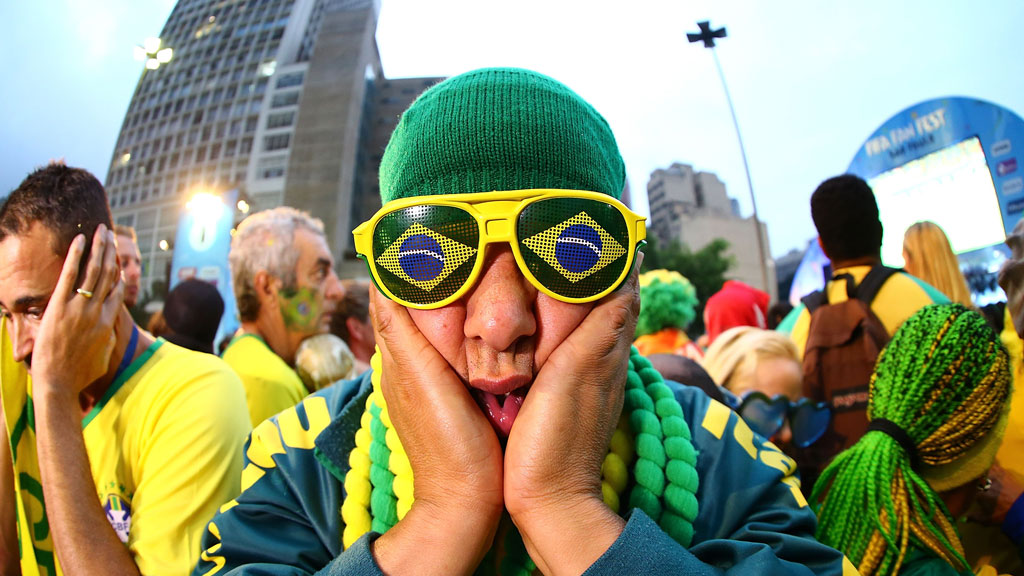Does losing a football game have to be the end of the world?
When Brazil were beaten in the 1950 World Cup by Uruguay, it was famously described as “our Hiroshima”. After losing 7-1 to Germany, is the hyperbole as bad this time?

It was a chastening, embarrassing experience for 2014 World Cup hosts Brazil: not losing to Germany in one of the semi-finals, but being thrashed in an abject display on home turf in front of tens of thousands of expectant supporters in Belo Horizonte.
Brazil have won the competition five times, more than any other country, but they have never managed this feat at home.
Hopes were high on Tuesday night that the national team would avenge the trauma of the 1950 “Maracanazo”, when Uruguay won the World Cup after beating Brazil 2-1 in Rio.
‘Our Hiroshima’
In a classic example of over-statement, Brazil’s greatest playwright Nelson Rodrigues described it as “something like our Hiroshima” – as if losing a football match can be compared to having a nuclear bomb fall on you.
Commenting on the latest drama, Rio sports website lancenet.com used the headline: “An embarrassment! Brazil suffers its biggest defeat in its history and sees Germany reach the final.”
It compared the defeat to the “Maracanazo”, which “made Brazil weep”. Now, it said, “the tears are pouring for the greatest of humiliations. A country brought to its knees! The most humbling defeat for a country celebrated worldwide for being ‘football’.”
The one silver lining? “The Mineirao stadium saw the sad chapter of 1950 fade, at least for now, in history. It will be difficult to remember that 2-1 defeat to Uruguay after what Germany did in this semi-final.”
Folha in Sao Paulo waxed philosophical, making it clear that in football-obsessed Brazil, the beautiful game is more than just a game – for better or for worse.
“Passion for football will survive, of course, despite yesterday’s nightmare,” it said. “But the massacre, that was brutal and unforgettable, didn’t only tarnish the mystique of the yellow and green shirts; maybe it also means the end of an era in which country and state, people and supporters, those who govern and team managers, nation and team, are seen as the same thing.”
Misery
Let us hope that Brazil’s players do not endure the misery suffered by the class of 1950. Midfielder Zizinho used to take his phone off the hook every year on the anniversary of the defeat to avoid calls asking why the team lost.
Goalkeeper Barbosa complained that he had suffered for 50 years, far longer than the maximum 30-year prison sentence in Brazil.
Coach Luiz Felipe Scolari – who won the World Cup with Brazil in 2002, but tasted defeat in the final of Euro 2004 when he was in charge of Portugal – was similarly emotional, saying it was the “worst day” of his life.
“The memory of this World Cup will always be tarnished now. It will be remembered as a tragedy,” said Michelle Gomes, a business manager in Rio de Janeiro.
“It’s a humiliation,” said Lourdes Moura, 88, a medical student in 1950 when Brazil lost. “Back then I cried, really cried. Right now I’m furious.”
‘Global catastrophe’
For Argentinian football legend Diego Maradona, South American footballing rivals Brazil “gave an extremely poor image”. But they were lucky they did not lose 8-0, which would have been a “global catastrophe”.
Many of Brazil’s columnists have adopted a more level-headed approach to the defeat, which could affect the electoral prospects of President Dilma Rousseff as she seeks a second term in October.
She, to her credit, has taken it in her stride, saying simply: “I’m immensely sorry for all of us, our fans and players. But let’s not let ourselves give up. Brazil, get up, dust yourself off and bounce back.” Wise words.